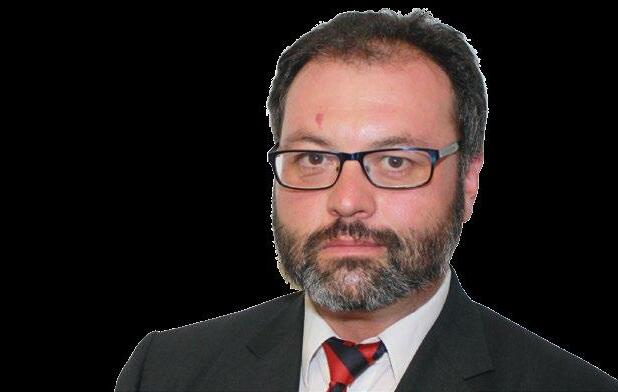
8 minute read
Editor’s Opinion
Jason MacLaurin SC
Editor, Brief | Barrister, Francis Burt Chambers
Our special section “Future Proof” ought to be of interest to (hopefully all) readers intending to participate in the future, which of course might already be here. Developing technology affects not only how law is (and ought ethically and professionally) to be practiced, but also provides novel subject matter for legal work, and questions about what the law should regulate. As noted in Brenda van Rensburg’s “A Macro Way to Reputation Damage” some jurisdictions, for instance in American Bar Association Rules, expressly stipulate that lawyers must keep abreast of technology. This special section also has Angelina Gomez on whether DAOs might become the new corporate form, Michael Woods providing his expertise on “Cyber Threat Landscape for the Legal Profession”, and Eli Bernstein on “The Rise and Rise of Stablecoins”.
Brief went for a title of “Future Proof”, rather than Alvin Toffler’s “Future Shock” (the “dizzying disorientation brought on by the premature arrival of the future”) which is the safe play given uncertainty as to the Toffler’s estate’s intellectual property rights and some of the Sussex’s recent initiatives.
Previous Brief editorials have noted the Sussex’s use of technology, especially the podcast, in a profitable, if not particularly productive, way,1 however they very recently announced that “Archewell Audio” would release a podcast series: “Archetypes.” Any cynical misgivings about the podcast’s title being mainly concerned with being catchy and marketable2 were surely dispelled when Markle announced that the “central question” lying at the heart of “Archetypes” is “where do these stereotypes come from? And how do they keep showing up and defining our lives?” and the Sussex’s filing a few weeks ago a trade mark application over “Archetypes” despite its ancient Greek origins, common usage in English from the 1540’s, Carl Jung’s estate likely being ropable and, most importantly it seems, a skin care and cleaning company already owning a trademark for the word.
Toffler’s “Future Shock” still resonates today. Notably, 50 years ago a 1972 edition of the Australian “Women’s Weekly” featured an article about the Tofflers visiting Australia on a book tour.3 In 2022 the title “Women’s Weekly” is problematic given it has been a monthly publication since 1983, and in any event the hottest controversy going at the moment seems to be how (and whether) to define the word “Women”.
The year 2022 features in science fiction artistic works about dystopian futures that often ventilate issues with which the law also grapples. 1973’s classic dystopian future movie Soylent Green is set in 2022, so it is too late to worry about spoiler alerts when noting its shocking iconic ending phrase “It’s people!” is at least an expression of the need for accurate and honest food ingredient labelling. And, while not explicitly set in 2022, this year marks the 70th anniversary of the famous “Twilight Zone”4 episode “To Serve Man” about seemingly benevolent aliens who arrive to help an Earth beset by multiple crises, citing as evidence of their good intentions an (encrypted) book “To Serve Man” and taking a polygraph test. The iconic and shocking revelatory line in the closing scene “It’s a cookbook!” highlights not only the unreliability of lie detector evidence, but also the absolute importance of reading the whole of the text before interpreting key phrases.
Set in March 2022, 2013’s “The Purge” is a dystopian future/horror/thriller movie about an America, in addressing a crisis in crime, violence and overcrowded prisons, having a government sanctioned annual 12-hour period where laws are suspended and any criminal activity is legal (sort of like the 120 minutes following Buddy Franklin kicking his 1,000th goal recently). Some critics say the film has been said to give rise to profound legal and moral questions such as the competition between the Hobbesian “Modern Unity State” versus the Althusian “Modern Federated Polity” models for civil society, and between legal positivism and natural law theories (the Hart-Fuller debate)5 about whether morality and the law in regards to the validity of and obedience to a law, or whether morality is the source of law’s binding power.
For the Editor, these complex issues were all very quickly cut through and went out the window when (spoiler alert) Ethan Hawke’s daughter’s boyfriend decides to use the

Charleton Heston starring in the 1973 ecological dystopian thriller “Soylent Green” set in 2022 – still not the year we were expecting but perhaps a pandemic is the better option?

It remains to be seen whether the Sussex’s podcasts will be as closely analysed as TS Eliot’s, famous poem “The Waste Land”, currently celebrating its 100th Anniversary, which commences with the memorable lines “April is the cruellest month, breeding lilacs out of the dead land, mixing memory and desire, stirring dull roots with spring rain”.6
It is often suggested that the themes of “The Waste Land” includes the degradation of human dignity arising from technological advances (which may become an increasing popular analysis from English literature students who are to be deprived of texts upon the Archetypal critical analysis method).7 Remarkably, one of, if not the main character, in “The Waste Land” is the (possible Archetype but in any event Greek Mythology figure) Tiresias who had the gift of prophecy but not to the extent that he predicted that hitting copulating snakes with a stick would result in Hera transforming him into a woman for 7 years, no doubt causing mayhem with pronouns and definitions (in another version of the myth, Hera just sends Will Smith to slap him).
Some recent technological legal mishaps may have unfortunately reinforced some stereotypes about the hot blooded passionate Latin American, with Peruvian lawyer, Hector Paredes Robles caught during a Zoom court hearing (to adopt an actual Latin phrase) in flagrante delicto which followed a previous episode where an Argentinian MP had to resign after being caught in a similar fashion during an online parliamentary session.8 In Mr Robles’ case the Judge angrily observed “we are witnessing obscene acts which represent a violation of public decency aggravated by the fact that they are being recorded nationally” and one assumes that if Hera was around and sympathised with the Judge, she would have fully endorsed or joined in with Tiresias’ use of a wacking stick. In any event, both lawyer and politician were no doubt wishing profoundly for the intervention of a cat filter on their zoom images.
2022 also involves (or marks anniversaries of) some notable apparent AI victories over humans in games many lawyers have an affinity for, and somewhat comfortingly regarded as having essential human elements (and other features) that, like lawyering, AI might be unlikely to conquer and take over. Just last month AI beat eight World Champions at bridge though many were quick to point out that the game did not involve bidding and was limited to declared play9 (Brief is aware of many avid bridge players among the profession, and perhaps some might explain to the Editor the significance of this, and also the rules of bridge, the principles and tactics behind it, and notable war stories, which might well require a word limit of, say, 16,000 words).
2022 is the 25th Anniversary of IBM’s Deep Blue’s Chess victory over Garry Kasparov, although it was conventionally thought that chess was easier for AI to conquer than bridge or poker, because those card games involved more human and less finite variables, and do not concern “perfect information” but rather “hidden information” which is not shared (giving hope to lawyers).
2022 is also the 15th Anniversary of AI solving checkers but only the 5th Anniversary of Microsoft ’s AI solving/ conquering Ms Pac-Man.
Ms Pac-Man is celebrating a 50th Anniversary, and Ms Pac-Man regarded by those in the know as being a superior game to the original Pac-Man (1980) but recently, Ms Pac-Man has been replaced by “Pac-Mom” due to the recent resolution of a longstanding intellectual property dispute.
And just when “Pac-Mom” is celebrating the resolution of the dispute and rebranding, they’ll probably find out Meghan Markle has changed her middle name to “Oprah” and applied for intellectual property protection over everything “MOM”. Although this is a special edition of Brief, with an upcoming special May edition focusing around Law Week 2022, we have many other items of interest including Dr Sagi Peari and Richard Winter on the Personal Property Securities Act and, with Human Rights at the forefront of news lately, Myrna El Fakhry Tuttle and Linda McKay-Panos on how “Canada’s Extraordinary Use of the Emergencies Act Poses Human Rights Concerns”.
We have Steven Penglis SC’s review and thought provoking comments upon Julian Grill’s book “Secret State” launched earlier this year. Our regular Taxing Matters section features Clare Thompson SC on the rebuttal of the presumption of advancement in the purchase of the marital home and David Garnsworthy addressing proportionality in legal costs.
As always we are grateful for the Law Society’s Young Lawyers Committee contributions with this edition having the usual and much appreciated items such as case notes and Aunt Juris. End Notes
1 Their 2020 $30M Spotify podcast deal had produced only one celebrity holiday extended audio instagram post/podcast. 2 Or Spotify executives who might have taken it as a welcome announcement that Archie had learned to type, making him potentially the most productive member of the family 3 “Future Shock”, The Australian Women’s Weekly (Wed 15 Nov 1972) . 4 For the younger generation: No it does not star Robert
Patterson and Kirsten Stewart. 5 See JL Hausmann “Purge-ian Jurisprudence” University of La Verne Law Review, M36, page 61. 6 Though April 2022 was perhaps not the cruellest, but rather the coolest month as it kicked off with Stone Cold
Steve Austin wrestling for the first time in 19 years at
Wrestlemania. 7 “Brief Encounter! Peruvian lawyer is caught on Zoom…” www.dailymail.uk 30/1/21 8 “Artificial intelligence beats eight world champions at bridge” www.theguardian.com 29/3/ 2022 9 See for instance “An Archetypal Approach to Eliot’s
“The Waste Land””, An Interdisciplinary Journal of
Literary Studies, Vol: 1, www.postscriptum.co.in; The
Belladonna: Eliot’s Female Archetype in The Waste Land,
Philip Sicker, Twentieth Century Literature, Vol. 30, No. 4 (Winter, 1984); and The Archetypal Imagery of T. S. Eliot
Genevieve W. Foster PMLA Vol. 60, No. 2 (Jun., 1945),
LEAVING A LASTINGLASTING LEGACYLEGACY
WILL HELP
HOMELESS DOGS
IN WA










